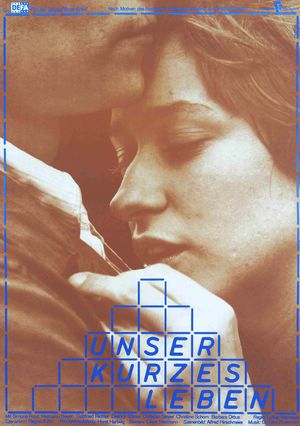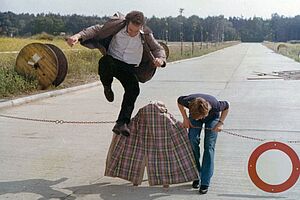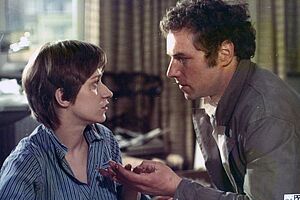Unser kurzes Leben
Director: Lothar Warneke, 116 Min., Color, Feature Film
Deutsche Demokratische Republik (DDR)
DEFA-Studio für Spielfilme, 1980
- Film/Video Format
- 35 mm
- Length in m
- 3093
- English Title
- Our Short Life
- Premiere Date
- Release Date (for Cinema)
- Literary Source
- Reimann, Brigitte: "Franziska Linkerhand", Roman

(Dir.: Lothar Warneke, 1980) Graphic Design: Helmut Wengler
Short Summary (English)
Franziska Linkerhand, a qualified architect divorced and up to now a kind of "master pupil" of a renowned architect, moves to a small town to meet new challenges. She wants to work in an architect's bureau in her new place of residence.
Franziska is a person who does not make any compromises; she makes great demands on herself. But she is also full of ideals and dreams. She would like to help build a town in which people feel good and at home. However, Franziska soon realizes the discrepancy between her wishful thinking and reality. The acting municipal architect Schafheutlin, who has long since become ossified in his ideas and norms and who, in many respects, is supposed to be Franziska's partner; quickly becomes her adversary.
Because of Franziska's rigorous manner, he is, however, seized with a restlessness which is new to him. Franziska's productive creativity is infectious... She gets to know Trojanowicz, who arouses deep passionate feelings in her and he responds to her in the same way. But Franziska's uncompromising challenge is too much for Trojanowicz.
Their love affair ends. In spite of this great disappointment, Franziska does not leave the small town. She has realized that a year is far too short to bring about any fundamental changes for the people.
Source: Progress Film-Verleih

(Dir.: Lothar Warneke, 1980) Photography: Klaus Goldmann

(Dir.: Lothar Warneke, 1980) Photography: Klaus Goldmann
Film Crew
- Director
-
- Lothar Warneke
- Script
-
- Lothar Warneke
- Scenario
-
- Regine Kühn
- Camera
-
- Claus Neumann
- Film Editing
-
- Erika Lehmphul
- Cast
-
- Simone Frost (Franziska Linkerhand)
- Hermann Beyer (Schafheutlin)
- Gottfried Richter (Trojanovicz)
- Dietrich Körner (Prof. Reger)
- Christian Steyer (Jazwauk)
- Christine Schorn (Gertrud)
- Barbara Dittus (Frau Helwig)
- Dieter Knust (Verwalter)
- Helmut Straßburger (Kowalski)
- Annemone Haase (Frau Kowalski)
- Uwe Kockisch (Wolfgang)
- Gerd Staiger (Architekt Grabbe)
- Karin Beewen (Krankenschwester)
- Birgit Frohriep (Wolfgangs Schwester)
- Freimut Götsch (Architekt)
- Gert Gütschow (Arzt)
- Annette Roth (geb. Woska) (Frau Krupkat)
- Evelin Splitt (Marios Mutter)
- Ingeborg Westphal (Sigrid)
- Helga Ziaja (Griepentrog)
- Heinz Hupfer (Architekt)
- Gisbert-Peter Terhorst (Wolfgangs Schwager)
- Heinz Brinkmann (Onkel Paul)
- Eberhardt Wintzen (Krupkat)
- Rüdiger Schaar (Architekt)
- Christian-Victor Keune (Rowdy)
- Thea Schmidt-Keune (Ältere Frau)
- Victor Keune (Älterer Mann)
- Roland Seidler (Rothaariger Junge)
- Renate Henoch (Hübsche Blondine)
- Karin-Clarissa Urban (Bardame)
- Assistant Director
-
- Jan Bereska
- Andreas Höntsch
- Assistant Camera
-
- Frank Bredow
- Klaus Goldmann
- Production Design
-
- Alfred Hirschmeier
- Script Editing
-
- Christa Müller
- Music
-
- Gerhard Rosenfeld
- Sound
-
- Hans-Joachim Kreinbrink
- Gerhard Ribbeck (Tonmischung)
- Costume Design
-
- Christiane Dorst
- Ruth Leitzmann
- Herbert Henschel
- Make-Up
-
- Frank May (geb. Zucholowsky)
- Brigitte Welzel
- Props
-
- Kurt Pentzien
- Willi Pape
- Production Management
-
- Horst Hartwig
- Unit Production Management
-
- Wolfgang Lange
- Egon Schlamann
- Rosalinde Schwarzer
- DEFA Photography
-
- Klaus Goldmann
Awards
- Kunstpreis des FDGB (1981): Kunstpreis des FDGB - Christa Müller
- Kunstpreis des FDGB (1981): Kunstpreis des FDGB - Lothar Warneke
- Kunstpreis des FDGB (1981): Kunstpreis des FDGB - Regine Kühn
- Kunstpreis des FDGB (1981): Kunstpreis des FDGB - Claus Neumann
- XII. Internationale Filmfestspiele Moskau 1981 (1981): Spezialpreis des sowjetischen Verbandes bildender Künstler
- 2. Nationales Spielfilmfestival der DDR Karl-Marx-Stadt (1982): Preis für Schnitt - Erika Lehmphul
- 2. Nationales Spielfilmfestival der DDR Karl-Marx-Stadt (1982): Schauspielerpreis für eine Nebenrolle - Helmut Straßburger
Short Summary (German)
Nach ihrer Scheidung entschließt sich die Architektin Franziska Linkerhand, für ein Jahr aus Berlin in eine Provinzstadt zu gehen - auch um sich von ihrem Professor, mit dem sie bisher zusammen arbeitete, freizumachen. Franziska ist eine Maximalistin, und rigoros vertritt sie ihren Anspruch, Ideal und Wirklichkeit in Übereinstimmung zu bringen. In der Stadt N. kommt sie in ein Kollektiv, dessen Chef Schafheutlin vor den Zwängen der Praxis bereits kapituliert hat. Auseinandersetzungen sind zwangsläufig. In dem Kipperfahrer Trojanovicz lernt sie einen neuen Mann kennen und lieben. Aber wie im Beruf geht sie auch im Privatleben keine Kompromisse ein. Und so scheitert diese Beziehung an der bequemen, kompromissbereiten Lebenseinstellung von Trojanovicz. Die Zusammenarbeit mit Schafheutlin indes entwickelt sich positiv. Durch ihr Engagement löst er sich aus seiner Erstarrung, während Franziska von seinem Realitätssinn profitiert. Sie entschließt sich, in N. zu bleiben.
(Quelle: Das zweite Leben der Filmstadt Babelsberg. DEFA-Spielfilme 1946-1992)
Short Summary (Other Languages)
Dopo aver divorziato, l'architetto Franziska Linkerhand decide di trasferirsi per un anno in una cittadina di provincia, anche per prendere le distanze dal suo professore, l’unico con cui abbia finora lavorato. Giunta nella città di N., inizia a collaborare nella squadra di Schafheutlin, che si è già arreso davanti alle costrizioni di uno studio in cui non mancano gli scontri. Franziska impara a conoscere e s'innamora di Trojanovicz, guidatore di autocarri, ma in amore, proprio come sul lavoro, la ragazza non è disposta a scendere a compromessi e la relazione naufraga. In compenso la collaborazione con Schafheutlin si sviluppa positivamente. Col suo impegno Franziska lo aiuta a essere meno rigido e impara a trarre vantaggio dal suo senso della realtà. La ragazza decide così di restare a N. (Italienisch)



